'I am Inca blood': Peru protests fire up a divided nation





Mon, January 30, 2023
By Alexander Villegas and Monica Machicao
LIMA/DESAGUADERO, Peru (Reuters) - In the Peruvian southern border town of Desaguadero, indigenous protester Adela Perez is defiant after almost eight weeks of deadly clashes that have roiled the Andean nation, hit its huge copper mines and strained the country's democratic institutions.
The country of some 34 million people has been in the throes of its worst unrest in decades since the abrupt Dec. 7 ouster and arrest of center-left President Pedro Castillo after he tried to illegally shutter Congress to avoid impeachment.
The son of peasant farmers, Castillo had been a champion of the rural poor and indigenous groups who propelled him to office in 2021, despite falling short on pledges to spread mining wealth and being hit by regular corruption probes.
His dramatic ouster has fired up a deep-seated anger in the rural provinces, especially in the copper-rich south, against the political and wealthy elite in the capital Lima, with protesters taking aim at Congress and new President Dina Boluarte, Castillo's former deputy.
The violence has left 48 people dead with 10 more civilians killed in accidents or other issues related to the blockades.
The protests, which show no sign of abating, threaten to snarl copper supply from the world's No.2 producer of the red metal and destabilize Peru's government with little sign of a political solution to the unrest due to infighting in Congress.
Protesters have pledged to fight on until new elections are held, Boluarte resigns and Congress is shut. Many want a new Constitution to replace a market-focused 1993 text. Nationwide polls show strong support for many of the demands.
"Mrs. Boluarte, you cannot command or militarize this place here," said Perez, near a road blockade at the Peru-Bolivia border that has stymied the flow of trucks for weeks in the region of Puno, one of the regions at the heart of the protests.
"You can't send the military here because the soldiers are our children."
The government has called for a political truce and dialogue, offered its support for new elections to be held soon and blamed "violent groups" for stoking unrest.
Puno, home to the Peruvian side of the iconic Lake Titicaca, was the location of the worst violence in the protests yet, with 18 protesters killed in the city of Juliaca as well as one policeman who was burned to death in his car.
The protests, while focused in the south, have spread across the nation, with hundreds of road blockades using trees, rocks and car tires jamming up transport. Tourism has suffered badly with Machu Picchu closed earlier this month.
It has also sparked a democratic crisis with no clear solution beyond new elections held quickly, which Boluarte has called for but a divided Congress has yet to ratify.
"It doesn't matter if she wants to kill us, to kill us with our children. We are never going to give up until she (Boluarte) resigns," said Carmen Rosa Inofuentes, a protester in Lima, where one person died in clashes in the last week.
"When she resigns, we will leave. If needed, we will sleep in the street; there is no other way. She brought us into this war. We will face the police because we are full of anger, and that anger is exploding and getting out of control."
'WE ARE SUFFERING'
Protesters have marched with banners calling Boluarte a "murderer" and refer to the protesters' deaths as "massacres". Some carry catapults or whips; others hold checkered multicolored Wiphala flags of the indigenous Andean groups.
"I am Inca blood," said Cirilo Yupanqui, wearing a pink gas mask while protesting in capital Lima. He railed against government claims that the protests were being led and riled up by criminal groups.
"I'm not a terrorist, as they say. I'm not a criminal. I have a formal job. Just look at how they treat us."
The protests have raised the specter of violence of years past in Peru, the center of the Incan empire hundreds of years ago, including clashes between rebel Maoist groups and the government in the 1980s and 1990s that saw thousands killed.
"How many people are dying? For the love of God, out Dina, get out of the government. Don't hurt us anymore," said one of the protesters in Lima, who asked not to be named, adding that inflation and economic hardship were sharpening people's anger.
"We are suffering, everything is becoming more expensive, and we don't even have enough to eat."
Peru's inflation ended 2022 at around 8.5% on an annual basis, with analysts saying that many of the protest regions were the hardest hit.
Jackelyn Boncano, a demonstrator in Lima, pleaded for global attention on what was happening.
"I want everyone to be aware of and support this struggle because it is now or never," she said, adding the current government needed to change. "They can't stay in power in Peru."
(Reporting by Alexander Villegas, Marco Aquino and Monica Machicao; Additional reporting by Reuters TV; Writing by Adam Jourdan, editing by Deepa Babington)





Mon, January 30, 2023
By Alexander Villegas and Monica Machicao
LIMA/DESAGUADERO, Peru (Reuters) - In the Peruvian southern border town of Desaguadero, indigenous protester Adela Perez is defiant after almost eight weeks of deadly clashes that have roiled the Andean nation, hit its huge copper mines and strained the country's democratic institutions.
The country of some 34 million people has been in the throes of its worst unrest in decades since the abrupt Dec. 7 ouster and arrest of center-left President Pedro Castillo after he tried to illegally shutter Congress to avoid impeachment.
The son of peasant farmers, Castillo had been a champion of the rural poor and indigenous groups who propelled him to office in 2021, despite falling short on pledges to spread mining wealth and being hit by regular corruption probes.
His dramatic ouster has fired up a deep-seated anger in the rural provinces, especially in the copper-rich south, against the political and wealthy elite in the capital Lima, with protesters taking aim at Congress and new President Dina Boluarte, Castillo's former deputy.
The violence has left 48 people dead with 10 more civilians killed in accidents or other issues related to the blockades.
The protests, which show no sign of abating, threaten to snarl copper supply from the world's No.2 producer of the red metal and destabilize Peru's government with little sign of a political solution to the unrest due to infighting in Congress.
Protesters have pledged to fight on until new elections are held, Boluarte resigns and Congress is shut. Many want a new Constitution to replace a market-focused 1993 text. Nationwide polls show strong support for many of the demands.
"Mrs. Boluarte, you cannot command or militarize this place here," said Perez, near a road blockade at the Peru-Bolivia border that has stymied the flow of trucks for weeks in the region of Puno, one of the regions at the heart of the protests.
"You can't send the military here because the soldiers are our children."
The government has called for a political truce and dialogue, offered its support for new elections to be held soon and blamed "violent groups" for stoking unrest.
Puno, home to the Peruvian side of the iconic Lake Titicaca, was the location of the worst violence in the protests yet, with 18 protesters killed in the city of Juliaca as well as one policeman who was burned to death in his car.
The protests, while focused in the south, have spread across the nation, with hundreds of road blockades using trees, rocks and car tires jamming up transport. Tourism has suffered badly with Machu Picchu closed earlier this month.
It has also sparked a democratic crisis with no clear solution beyond new elections held quickly, which Boluarte has called for but a divided Congress has yet to ratify.
"It doesn't matter if she wants to kill us, to kill us with our children. We are never going to give up until she (Boluarte) resigns," said Carmen Rosa Inofuentes, a protester in Lima, where one person died in clashes in the last week.
"When she resigns, we will leave. If needed, we will sleep in the street; there is no other way. She brought us into this war. We will face the police because we are full of anger, and that anger is exploding and getting out of control."
'WE ARE SUFFERING'
Protesters have marched with banners calling Boluarte a "murderer" and refer to the protesters' deaths as "massacres". Some carry catapults or whips; others hold checkered multicolored Wiphala flags of the indigenous Andean groups.
"I am Inca blood," said Cirilo Yupanqui, wearing a pink gas mask while protesting in capital Lima. He railed against government claims that the protests were being led and riled up by criminal groups.
"I'm not a terrorist, as they say. I'm not a criminal. I have a formal job. Just look at how they treat us."
The protests have raised the specter of violence of years past in Peru, the center of the Incan empire hundreds of years ago, including clashes between rebel Maoist groups and the government in the 1980s and 1990s that saw thousands killed.
"How many people are dying? For the love of God, out Dina, get out of the government. Don't hurt us anymore," said one of the protesters in Lima, who asked not to be named, adding that inflation and economic hardship were sharpening people's anger.
"We are suffering, everything is becoming more expensive, and we don't even have enough to eat."
Peru's inflation ended 2022 at around 8.5% on an annual basis, with analysts saying that many of the protest regions were the hardest hit.
Jackelyn Boncano, a demonstrator in Lima, pleaded for global attention on what was happening.
"I want everyone to be aware of and support this struggle because it is now or never," she said, adding the current government needed to change. "They can't stay in power in Peru."
(Reporting by Alexander Villegas, Marco Aquino and Monica Machicao; Additional reporting by Reuters TV; Writing by Adam Jourdan, editing by Deepa Babington)
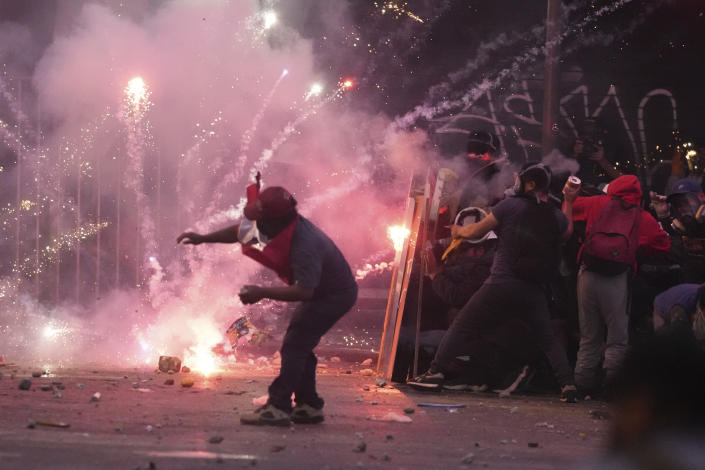
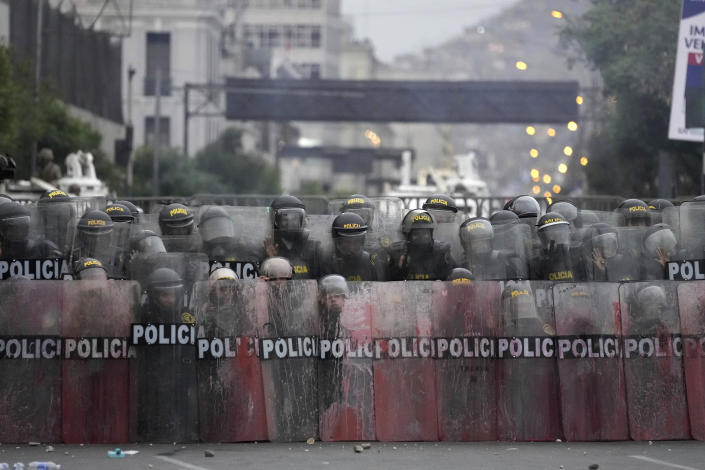

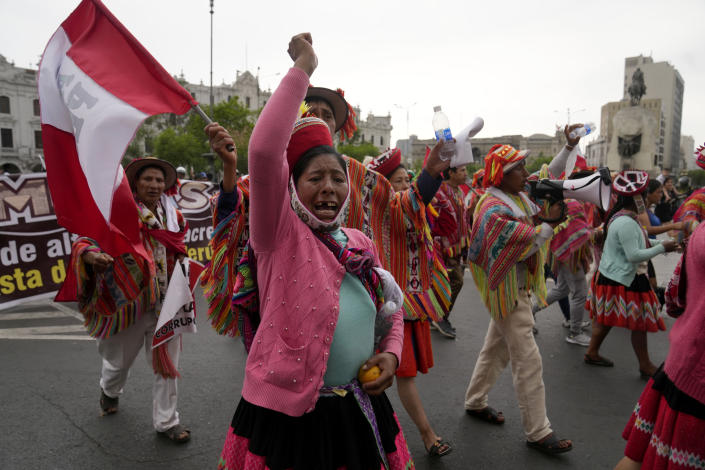

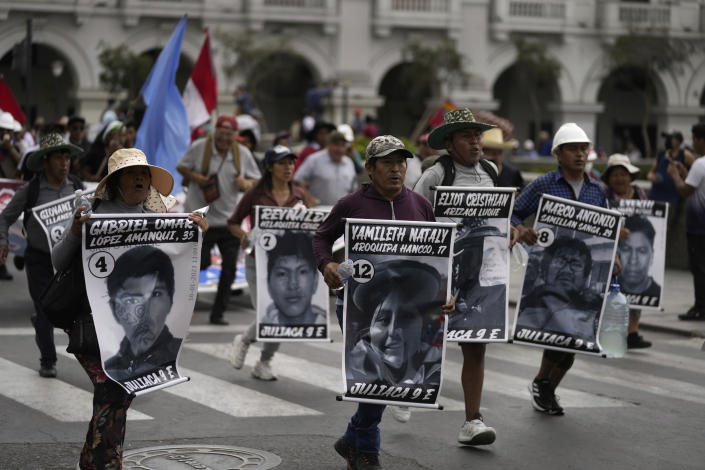
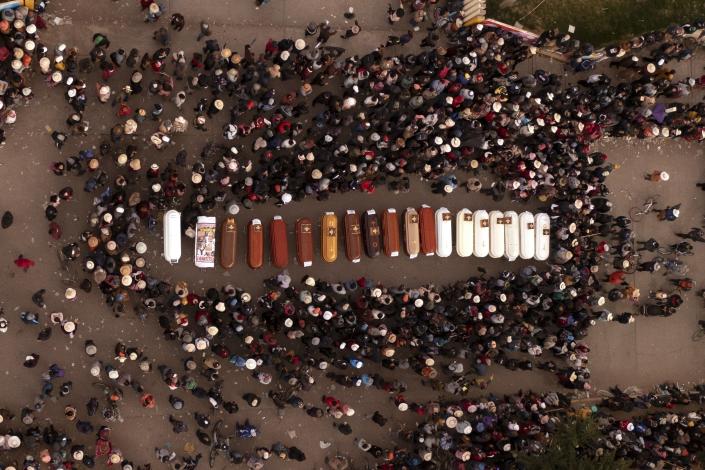
Residents gather round the coffins containing the remains of people who died during protests demanding the resignation of Peruvian President Dina Boluarte, in Juliaca, Peru, Tuesday, Jan. 10, 2023. Fifty-seven people have died amid the unrest, including 45 in direct clashes with the police. One police officer has also been killed. (AP Photo/Jose Sotomayor)
JOSHUA GOODMAN
Mon, January 30, 2023
MIAMI (AP) — A group of House Democrats is urging the Biden administration to suspend all U.S. security assistance to Peru over a “pattern of repression” of antigovernment protests that has resulted in more than 50 civilian deaths.
The letter, sent Monday and a copy of which was shared with The Associated Press, urges the Biden administration to halt all security assistance until it can confirm that the crackdown has ended and the Peruvian officials responsible for human rights abuses are being held accountable.
Peru's foreign minister is in Washington this week seeking international support for President Dina Boluarte's increasingly besieged government. Pressure has been mounting on Boluarte, the vice president under President Pedro Castillo, to resign the post she inherited last month when Castillo was impeached and arrested for his ill-fated attempt to close Peru's Congress.
“Security forces have indiscriminately responded with almost no regard for protestors’ human rights,” according to the letter, which was signed by 20 mostly progressive House Democrats. “Rather than working to deescalate tensions, the Boluarte government has substantially increased tensions — including classifying protesters as ‘terrorists’ and limiting citizens’ right of movement.”
The U.S. provides more than $40 million annually to Peru in security assistance, according to the Washington Office on Latin America. The vast majority is aimed at helping Peru counter drug trafficking.
While initially protesters were demanding Castillo's release from jail, the unrest has spread across the country, galvanizing the support of many poor, indigenous Peruvians who have benefitted little from Peru's mining-driven economic boom.
Protesters demand that both Boluarte and Congress stand down and that new elections be held this year. Lawmakers rejected that Friday, but after another protester died and Boluarte urged them to reconsider, Congress narrowly agreed Monday to debate a proposal to hold elections in October.
Meanwhile, as the protests stretch into their second month, beleaguered security forces have become more forceful.
Among the incidents cited in the letter organized by Rep. Susan Wild of Pennsylvania was the national police raid on student dormitories at San Marcos University in Lima, which included the mass arrest of nearly 200 people. That shocked many Peruvians because campuses have long been off limits to security forces except when crimes are being committed.
The campus invasion drew sharp condemnation from the Inter-American Commission on Human Rights, which said it collected testimony from civil society groups who said law enforcement officers invaded the bedrooms of student leaders, slung racist remarks at indigenous activists and forced women to strip naked and do squats.
Officials from the United Nations and European Union have strongly condemned what they consider the disproportionate use of force. The Biden administration has been more measured, calling for impartial investigations into abuses while also expressing support for Boluarte's efforts to restore calm and seek a political solution.
Amid the unrest, outgoing U.S. Ambassador Lisa Kenna announced an additional $8 million in U.S. support for coca eradication efforts in the remote Upper Huallaga valley. She has also met with the defense minister and other Cabinet members.
Such actions send an “ambiguous message," according to the letter, which was also signed by Rep. Alexandria Ocasio-Cortez of New York, Rep. Pramila Jayapal of Washington and Rep. Jim McGovern of Massachusetts, a longtime voice for human rights in Latin America.
“The U.S. government can and must do more,” they wrote. “We believe our proposed actions would send a powerful signal in support of fundamental rights and help promote effective engagement for a political resolution.”
A copy of the letter was also sent to Secretary of State Antony Blinken and Secretary of Defense Lloyd Austin.
___
Joshua Goodman on Twitter: @APJoshGoodman
No comments:
Post a Comment